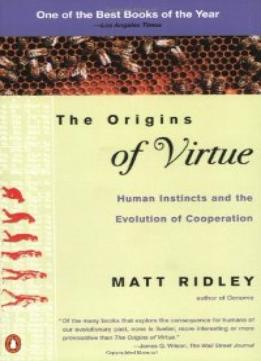
The Origins Of Virtue: Human Instincts And The Evolution Of Cooperation
by Matt Ridley /
1998 / English / PDF
5.3 MB Download
If, as Darwin suggests, evolution relentlessly encourages the survival of the fittest, why are humans compelled to live in cooperative, complex societies? In this fascinating examination of the roots of human trust and virtue, a zoologist and former American editor of the Economist reveals the results of recent studies that suggest that self-interest and mutual aid are not at all incompatible. In fact, he points out, our cooperative instincts may have evolved as part of mankind's natural selfish behavior–by exchanging favors we can benefit ourselves as well as others. Brilliantly orchestrating the newest findings of geneticists, psychologists, and anthropologists, The Origins of Virtue re-examines the everyday assumptions upon which we base our actions towards others, whether in our roles as parents, siblings, or trade partners. With the wit and brilliance of The Red Queen, his acclaimed study of human and animal sexuality, Matt Ridley shows us how breakthroughs in computer programming, microbiology, and economics have given us a new perspective on how and why we relate to each other. • Ridley's previous book, The Red Queen, was short-listed for the Writers' Guild Award for nonfiction. Human life, scientific journalist Matt Ridley suggests, is a complex balancing act: we behave with self-interest foremost in mind, but also in ways that do not harm, and sometimes even benefit, others. This behavior, in a strange way, makes us good. It also makes us unique in the animal world, where self-interest is far more pronounced. "The essential virtuousness of human beings is proved not by parallels in the animal kingdom, but by the very lack of convincing animal parallels," Ridley writes. How we got to be so virtuous over millions of years of evolution is the theme of this entertaining book of popular science, which will be of interest to any student of human nature











